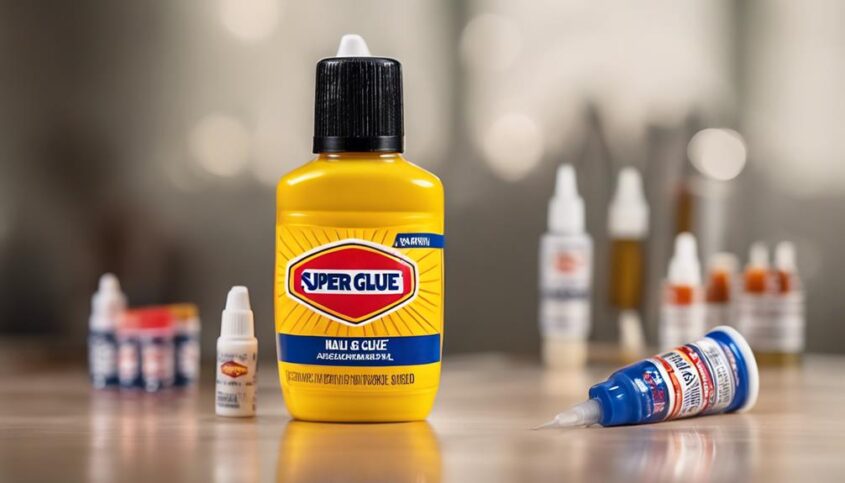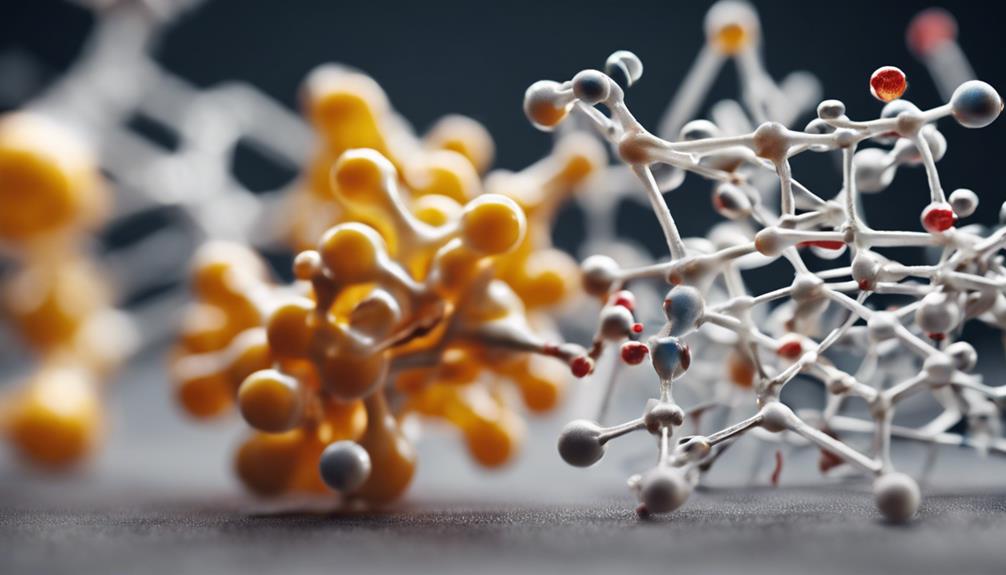Whats the Difference Between Super Glue and Nail Glue?

Super Glue, or cyanoacrylate adhesive, bonds quickly with strong adhesion, ideal for rapid fixes. Nail Glue, on the other hand, offers longer drying times, allowing for precision and adjustments. Super Glue sets fast for immediate use, while Nail Glue provides flexibility for various applications. Super Glue is rigid and durable, suitable for a range of materials, while Nail Glue is tailored for nail art and precision work. Their differences extend to removal processes and safety considerations as well. Understanding these variations can help in choosing the right adhesive for your needs.
Key Takeaways
- Super Glue bonds rapidly, ideal for quick fixes on various materials.
- Nail Glue offers longer drying time for precision application in nail art.
- Super Glue excels in strength and quick setting for strong bonds.
- Nail Glue tailored for artificial nails with flexibility and adjustment time.
- Super Glue removal challenging, can cause skin irritation; Nail Glue dissolves with warm water, safer for skin.
Chemical Composition

Distinguished by their chemical composition, Super Glue and Nail Glue exhibit distinct properties and applications in the realm of adhesives. Super Glue, also known as cyanoacrylate adhesive, is renowned for its rapid bonding capabilities and incredibly short drying time. This adhesive works through a chemical reaction with surface moisture, forming strong bonds within seconds. The bonding strength of Super Glue is impressive, making it ideal for quick fixes and tight joints.
On the other hand, Nail Glue, often based on ethyl cyanoacrylate, offers a slightly longer drying time compared to Super Glue. The chemical composition of Nail Glue allows for a more flexible bond, catering to the demands of artificial nail applications. While Nail Glue may not provide the instantaneous bonding of Super Glue, it compensates with enhanced flexibility and durability in certain applications.
Understanding the chemical reactions and bonding strengths of these adhesives is crucial in selecting the most suitable product for specific bonding needs.
Setting Time
When comparing Super Glue and Nail Glue, one notable difference lies in their setting time.
- Drying Process: Super Glue, known for its rapid bonding capabilities, typically sets within seconds due to its cyanoacrylate composition. Nail Glue, on the other hand, is formulated with specific polymers to allow for a slightly longer drying process, catering to the application needs in nail art.
- Curing Time: The curing time of these adhesives is influenced by their chemical composition. Super Glue achieves a strong bond quickly, ideal for instant fixes, while Nail Glue is designed to provide flexibility during application, giving users more time to adjust and perfect their nail designs.
- Adhesive Properties: Super Glue's quick setting time is favored for its instant adhesion to various materials, making it a go-to for quick repairs. In contrast, Nail Glue offers a balance between setting speed and maneuverability, ensuring precise placement of artificial nails without compromising bonding strength.
- Bonding Strength: While Super Glue boasts immediate bonding strength, Nail Glue provides a reliable hold that accommodates the intricate and delicate nature of nail art, allowing for durable and long-lasting results.
Bond Strength

When comparing super glue and nail glue, it is essential to consider their bond strength. The adhesive power comparison between the two types of glue plays a significant role in determining their effectiveness.
Additionally, the durability and resilience of the bond created by each glue type are crucial factors to examine.
Adhesive Power Comparison
Super glue and nail glue can be distinguished by their adhesive power, with each displaying varying levels of bond strength. When comparing their adhesive strength, it's essential to consider the following:
- Quick Bonding: Super glue is known for its rapid bonding capabilities, creating strong adhesion in seconds.
- Precision Application: Nail glue is designed for precise application on nails, offering a reliable bond for artificial nails and nail art.
- Impact Resistance: Super glue provides high impact resistance, making it suitable for repairs on a variety of materials.
- Flexibility: Nail glue offers flexibility once dried, allowing for natural movements without compromising the bond.
Understanding these differences in adhesive power can help users choose the most appropriate glue for their versatile applications.
Durability and Resilience
In assessing the durability and resilience of super glue and nail glue, their bond strength plays a crucial role in determining their effectiveness for various applications. When comparing the resistance properties and longevity of these adhesives, it is essential to consider their ability to withstand different stressors over time. Here is a table highlighting key aspects of bond strength for super glue and nail glue:
| Bond Strength Aspect | Super Glue | Nail Glue |
|---|---|---|
| Impact Resistance | High | Medium |
| Water Resistance | Low | High |
| Flexibility | Low | Medium |
Understanding the differences in bond strength characteristics can aid in selecting the most suitable adhesive for specific durability requirements and resilience needs.
Flexibility
When comparing Super Glue and Nail Glue, one important aspect to consider is their flexibility in bonding.
Super Glue is known for its durability in creating strong bonds, while Nail Glue is designed for precise application on nails.
Understanding the flexibility of each adhesive can help users choose the best option for their specific bonding needs.
Super Glue Durability
The durability of this adhesive is directly related to its ability to withstand varying degrees of stress and strain. When comparing the durability of super glue to nail glue, the longevity assessment reveals some key differences:
- Flexibility: Super glue tends to be rigid and may not withstand constant bending or movements.
- Impact Resistance: Super glue offers excellent resistance to impacts, making it suitable for repairing items that experience physical stress.
- Moisture Resistance: Super glue is vulnerable to moisture, which can weaken its bond over time.
- Temperature Tolerance: Super glue can degrade under extreme temperatures, affecting its durability in such conditions.
Understanding these factors is crucial for selecting the right adhesive based on the specific project requirements.
Nail Glue Application
With a focus on flexibility, nail glue application requires precision and attention to detail to ensure a strong and lasting bond. Proper nail prep is crucial before applying the glue to ensure maximum adhesion. Ensuring the nails are clean, dry, and free of any oils helps the glue bond effectively.
Additionally, understanding the drying time of the nail glue is essential to prevent any premature smudging or lifting of the nails. When it comes to removal, using the correct process is vital to avoid damage to the natural nail. Knowing the right timing for reapplication is also key to maintaining healthy and strong nails while enjoying the benefits of nail glue for extended periods.
Flexibility in Bonding
Achieving optimal flexibility in bonding is essential for ensuring a durable and long-lasting adhesion between surfaces. When considering bonding flexibility and strength, it is crucial to take into account material compatibility and longevity.
Here are four key factors to consider when evaluating the flexibility of adhesives:
- Material Compatibility: The adhesive must be compatible with the materials being bonded to ensure a strong and lasting bond.
- Flexibility Range: The adhesive should offer a range of flexibility to accommodate any movement or stress the bonded surfaces may experience.
- Longevity: A flexible bond should maintain its strength over time to ensure the durability of the adhesive.
- Environmental Factors: Consider the environmental conditions the bond will be exposed to, as these can impact the flexibility and longevity of the adhesive.
Application Area
When determining the application area for Super Glue and Nail Glue, it is essential to consider their specific bonding properties and intended uses.
Super Glue, known for its rapid drying process and versatility in use, is ideal for bonding a wide range of materials such as metal, plastic, and rubber. Its quick-drying nature makes it perfect for instant repairs and projects that require immediate bonding.
On the other hand, Nail Glue is designed for precision application on nails, offering a strong and long-lasting bond specifically for artificial nails or nail art. The drying time differences between the two glues are significant, with Nail Glue allowing more time for adjustments before setting, ensuring a perfect application.
While Super Glue excels in strength and speed, Nail Glue shines in providing a secure bond tailored for nail-related applications. Understanding these distinctions is crucial for achieving optimal results in various bonding tasks.
Removal Process

An important aspect to consider when comparing Super Glue and Nail Glue is the process involved in removing these adhesives.
- Removal Techniques: Super Glue can be challenging to remove from skin, requiring acetone or nail polish remover, while Nail Glue often dissolves with warm soapy water, making it gentler on the skin.
- Skin Safety: Super Glue can cause irritation and burns if not removed properly, emphasizing the need for caution during the removal process. Nail Glue, formulated for use on nails, is generally milder and less likely to cause skin issues.
- Nail Damage: Improper removal of Super Glue can lead to nail damage, weakening the nail bed. Nail Glue, being specifically designed for nails, is less likely to cause such damage if removed correctly.
- Adhesive Residue: Super Glue may leave stubborn residue behind, requiring additional effort to clean up. Nail Glue, being nail-friendly, tends to leave less residue, promoting a smoother removal process.
Safety Considerations
Considering the differences in removal techniques and potential skin reactions between Super Glue and Nail Glue, it is imperative to address the safety considerations associated with the use of these adhesives. Safety precautions should always be a top priority when working with strong adhesives like Super Glue. It is essential to avoid skin contact as Super Glue can cause skin irritation and even bond skin together.
When using Nail Glue, proper ventilation is crucial due to the strong fumes it emits. It is advisable to work in a well-ventilated area or use a mask to prevent inhaling the fumes.
Additionally, both Super Glue and Nail Glue should be kept out of reach of children and pets to prevent accidental ingestion, which can lead to serious health complications. When using these adhesives, it is recommended to wear protective gloves to minimize skin contact and reduce the risk of skin reactions.
Frequently Asked Questions
Can Super Glue Be Used as a Substitute for Nail Glue?
While super glue may offer adhesive strength, it is not recommended for nail strengthening or as a substitute for nail glue. Application techniques and drying time differ, impacting the overall performance and safety for nails.
How Long Does Nail Glue Typically Last Before Needing to Be Reapplied?
Nail glue's longevity can vary based on factors like application technique and nail care. To maintain a lasting hold, apply adhesive sparingly, avoid excessive moisture exposure, and reapply as needed for optimal results.
Are There Any Potential Health Risks Associated With Using Super Glue or Nail Glue on Nails?
Toxicity concerns and potential hazards exist when using super glue or nail glue on nails. Allergic reactions may occur, emphasizing the importance of safety precautions. Individuals should be aware of these risks and follow proper guidelines for safe application.
Can Super Glue or Nail Glue Be Used on Other Materials Besides Nails?
Innovative minds find super glue and nail glue indispensable in their creative endeavors. From intricate craft projects and jewelry making to household repairs and DIY projects, these adhesives exhibit remarkable versatility beyond their conventional nail applications.
Is There a Specific Brand of Super Glue or Nail Glue That Is Recommended for Use on Nails?
When it comes to nail glue, specific brands like KISS and IBD are often recommended for nail applications due to their strong bond and gentle formulas. Application techniques play a crucial role in ensuring a secure and long-lasting hold.
Conclusion
In conclusion, although both super glue and nail glue are adhesives used for bonding materials, they have differences in their chemical composition, setting time, bond strength, flexibility, application area, removal process, and safety considerations.
It is important to choose the right type of glue for the specific task at hand to ensure successful bonding results. Interestingly, statistics show that super glue is used in over 75% of household repairs due to its quick-drying and strong adhesive properties.




